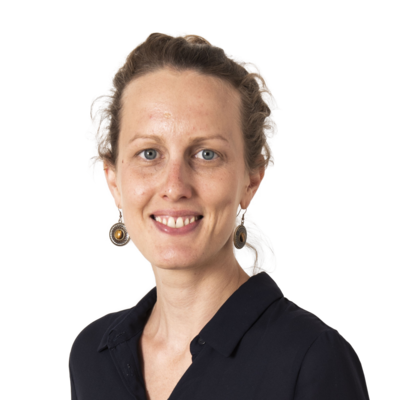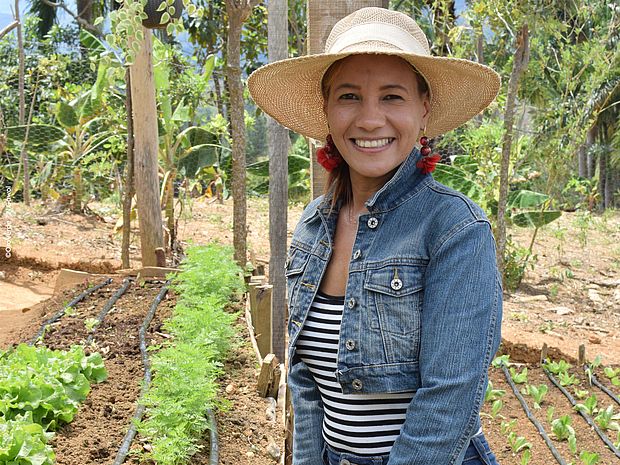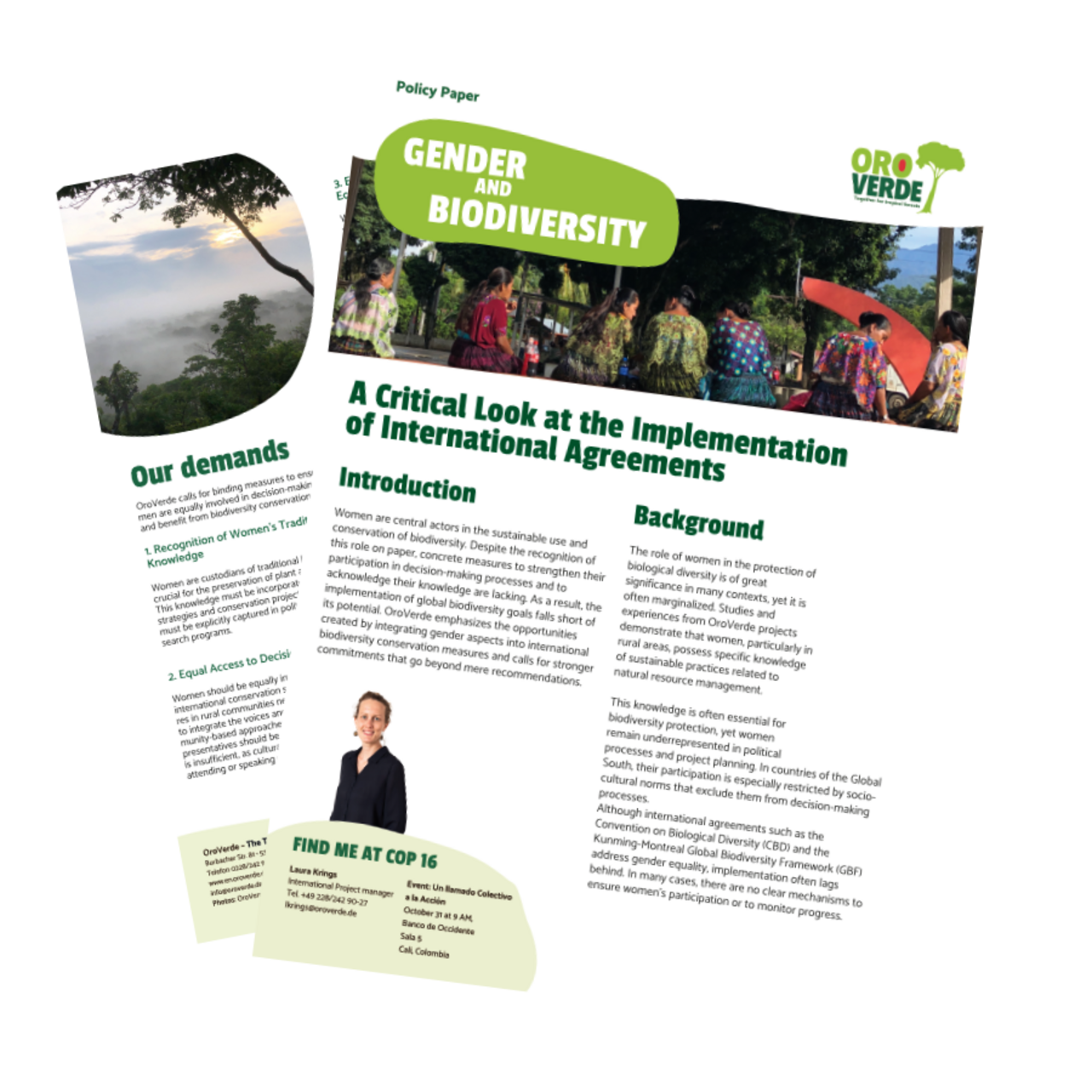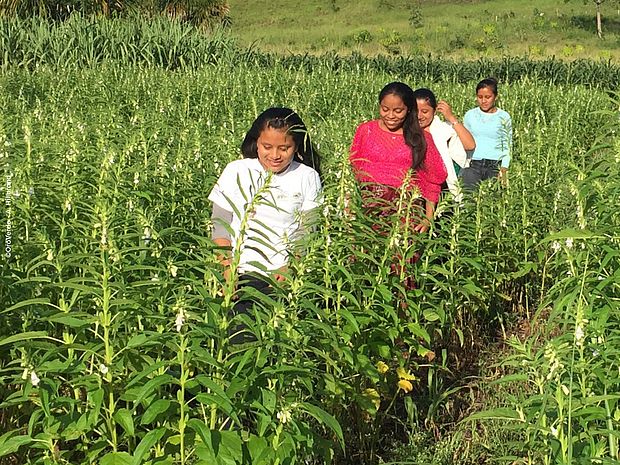Women are essential contributors to the sustainable use and conservation of biodiversity. Although their crucial role is recognized in theory, there is a significant gap when it comes to implementing concrete measures that enhance their participation in decision-making processes and accredit their valuable knowledge. This means that the realization of global biodiversity goals often falls short of its true potential.
OroVerde highlights the immense opportunities that can arise from integrating gender perspectives into international biodiversity conservation efforts. By doing so, we not only empower women but also enrich the decision-making process with diverse insights. Our organization calls for stronger commitments that transcend mere recommendations, urging a collective effort to ensure that women's voices are heard and their contributions valued in the fight to protect our planet's rich biodiversity.
Gender and Biodiversity: A Powerful Connection for a Sustainable Future
The connection between biodiversity protection and gender roles has been a topic of political discussion since several years. Biodiversity — the rich variety of life on Earth — is not only essential for human survival and well-being but is also deeply intertwined with social and economic factors. In many cultural contexts, the roles of women and men in activities related to food security, income generation, and household responsibilities differ significantly. Particularly in rural areas, traditional gender roles shape the relationship to natural resources, leading to distinct responsibilities.
In agriculture, a crucial activity for much of the rural population in the Global South, tasks are often divided along gender lines. Other vital chores, such as collecting firewood, fetching water, and gathering medicinal plants, are frequently assigned to women. This division means that women possess specific knowledge about plant and animal species, their uses, and sustainable practices for their management and conservation. They have a vested interest in protecting these resources and have been involved in their preservation for generations.
The Role of Gender Equality in Conservation
In many cultural contexts, the separation of roles is so pronounced that knowledge about natural resources is generated and passed down exclusively within women’s communities. This expertise is often crucial for effective biodiversity management strategies.
Despite the recognition of the link between biodiversity and gender equality, this connection is still often overlooked in political processes and conservation measures. Gender inequalities can hinder communities' ability to effectively protect biodiversity, while promoting gender equality can unlock new opportunities for sustainable and inclusive conservation strategies.
Engaging Women: A Critical Element in Decision-Making for Biodiversity
Women play a crucial role in the preservation of biodiversity, and their involvement can significantly enhance decision-making, representation in conservation fields, and the effectiveness of community-based initiatives. Understanding this dynamic is essential for developing equitable conservation strategies.
In practice, women's participation in decision-making processes is frequently limited. They are often excluded from decisions related to land and resource management, impacting crucial aspects like land use and conservation strategies. Additionally, women are underrepresented in leadership roles within conservation, facing systemic biases that hinder their professional advancement.
The reasons for this disparity are rooted in complex socio-cultural contexts. In many rural areas, local authorities lead community-based governance processes. While specific women’s groups exist, many land use and development decisions are made without considering their needs. Economic systems in rural areas often favor men, and patriarchal control within households restricts women's economic autonomy.
Empowering Women in Biodiversity Decision-Making
Access to decision-making also involves planning with external actors like local and national authorities and civil society. However, representatives may lack training to address women's needs and may rely on traditional authority structures. There is a notable tendency to maintain patriarchal systems for power preservation, with all actors, often unconsciously, playing a role in this dynamic.
Access to education is another critical factor influencing participation. In many contexts, boys and men have significantly higher opportunities for schooling and learning the official language, which limits girls' and women's involvement in decision-making processes, including those related to natural resource management and access to governmental or civil society support.
Empowering women in these areas is not only a matter of fairness but a vital strategy for enhancing biodiversity conservation efforts worldwide.
OroVerde projects related to gender and biodiversity
As part of the IKI ForestValues project, funded by the International Climate Initiative (IKI) of the Federal Ministry for the Environment, Nature Conservation, Nuclear Safety and Consumer Protection (BMUV), a study was conducted in 2022 on the context of women in Guatemala regarding the creation of alternative income sources through diverse agroforestry systems.
The study clearly shows that women in the project communities play a central role in agricultural and household work, yet this work is neither adequately recognized nor compensated. In particular, care work is not considered an economic activity, and women's support in agricultural work is merely seen as assistance rather than as independent labor. Furthermore, indigenous women experience a heightened form of discrimination. One of the problems is, that they are often denied access to learning Spanish due to their roles in preserving traditions (including traditional languages). While many women express a desire to learn Spanish, they lack the opportunities to do so, which further restricts their independence and participation in decision-making processes.
The study indicates that the needs of women and men in project work must be considered separately. Simply including women in activities primarily designed for men is not sufficient to improve their long-term societal standing. It was found that existing training programs are appreciated by women; however, transferring learned knowledge into daily life requires specific adjustments. Targeted measures are necessary to address the needs of women and help them gain greater independence.
A central step toward gender equality involves actively engaging men in the processes of change. Only through a shared understanding of gender inequality and its negative impacts on women—especially in the context of climate change—can a fairer distribution of responsibilities and opportunities be achieved.
The Global Program "Creating Opportunities in Rural Areas through the Promotion of Climate-Resilient Agriculture and Political Participation" (2023-2027), funded by the Federal Ministry for Economic Cooperation and Development (BMZ), specifically promotes measures to enhance political engagement aimed at improving the living conditions of women and young people.
Women in rural regions of Guatemala, Mexico, and Honduras face significant structural challenges. They often have limited access to education and economic resources, are disadvantaged in patriarchal societies, and are largely excluded from political and economic decision-making processes. Women bear a dual burden, as they are primarily responsible for household and care work while also being involved in agriculture or fishing, often without compensation. Their work is frequently unrecognized, and they have limited opportunities to improve their situation due to restricted access to government support programs and markets. This structural disadvantage is exacerbated in regions heavily impacted by climate change, where women's livelihoods are increasingly threatened.
The Global Program aims to specifically address these challenges for women and young adults. Strengthening the political participation of women and young adults is a key component. They are trained to advocate for their interests at local and national levels in decision-making processes. This includes developing networks, promoting women into leadership positions, and engaging them in political programs that address their specific needs. The goal is to create long-term opportunities that enable women to achieve economic independence and actively participate in shaping their futures. By combining measures for economic empowerment and political participation, the program seeks not only to improve the living conditions of women but also to sustainably reduce structural inequalities and their limited access to political decision-making spaces.
In the forests of Mesoamerica, human rights violations and environmental destruction are prevalent. Local communities rely on these forests for their livelihoods, but illegal logging, mining, and drug trafficking threaten their survival. Forest defenders, particularly women, are on the front lines, risking their lives for environmental protection.
OroVerde is launching a significant initiative in collaboration with partner organizations from Central America to protect those who advocate for the forests and natural landscapes of the region. The project aims to empower and safeguard affected individuals, groups, and organizations. A comprehensive case management system will be developed to document human rights violations and provide support to those impacted. Urgent cases will be promptly assessed to take immediate action, ensuring that people in critical situations can be quickly rescued from danger. Others may require legal, medical, or psychological assistance. Thanks to an extensive network of local and regional organizations, help can be delivered swiftly and effectively.
Particularly at risk in this context are women environmental defenders. They often face heightened vulnerability due to intersecting challenges related to gender and their activism. Women in these roles frequently combat not only environmental degradation but also systemic gender inequalities that can lead to targeted violence and harassment. Their dedication to protecting their communities and natural resources places them in precarious situations, often without the necessary legal or social protections. By specifically addressing the risks faced by women activists, the initiative seeks to ensure that their contributions are recognized and their safety prioritized, thereby creating a more inclusive and effective approach to environmental advocacy in Central America.
The BioFinCas project, also funded by the International Climate Initiative of the BMUV, focuses on scaling up financing solutions for biodiversity-friendly agriculture. A key component of this project is its gender approach. In the agricultural sector, significant gender-specific challenges prevent women from equally benefiting from financing and support programs. Although women make up about 50% of the global agricultural workforce, they have inadequate access to financial resources, technical assistance, and land ownership. This not only undermines their economic independence but also limits their ability to engage in sustainable and biodiversity-friendly agricultural practices. In fact, only about 7% of investments in agriculture go directly to women, highlighting a significant funding and support gap.
Moreover, there are substantial gaps in data collection and analysis, particularly at the intersection of gender, access to financial services, and biodiversity-friendly agricultural practices. These data deficits hinder the development of tailored solutions that promote both gender equality and sustainable agriculture. In countries like Mexico, Guatemala, and the Dominican Republic, where coffee and cocoa are vital economic sectors, the situation is exacerbated by a lack of gender-sensitive financial products and political mechanisms.
The project addresses these challenges by pursuing a comprehensive gender mainstreaming approach. Initially, a desk research analysis was conducted to understand the national context concerning existing laws, policies, and social conditions. This facilitated the integration of initial gender-sensitive measures. In the early project phase, field-based research will identify specific gender-related needs and barriers.
Additionally, a detailed Gender Action Plan will be developed in the first project year to ensure that all project activities are at least gender-responsive. These activities include the development and testing of six risk-financing solutions, which will be evaluated for gender equity by pilot groups. Complementary to this, five digital multifunctional tools will be created to support the financial and economic inclusion of women in the agricultural sector.
Another central element of the project is the establishment of a Gender Working Group and the appointment of a Gender Representative to ensure that gender issues are continuously considered in all aspects of the project. Through workshops, training sessions, and policy analyses, the project aims to close existing gender gaps and scale up gender-sensitive solutions.
By adopting this inclusive approach, the project directly addresses the issues of inadequate funding, technical support, and political mechanisms that disadvantage women in the agricultural sector. It aims to dismantle these barriers and promote gender equality in the long term by developing and disseminating gender-sensitive financial solutions.
Questions about the topic?

Svenja Schäfer
Phone: +49 228 24290-66
sschaefer[at]oroverde[dot]de

Laura Krings
Phone: +49 228 24290-27
lkrings[at]oroverde[dot]de
Photo credits: S. Schäfer (Title, Women in Guatemala), OroVerde - N. Gawol (Wendy Jaquez), OroVerde - A. Hillbrand (Youth project)





